
Spyridium globulosum, commonly known as basket bush, is a species of flowering plant in the family Rhamnaceae and is endemic to coastal areas in the south-west of Western Australia. It is a shrub with relatively large leaves and heads of flowers covered with whitish hairs.
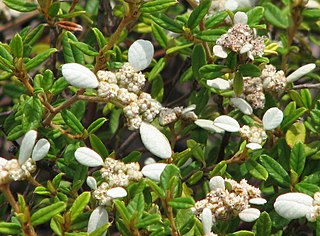
Spyridium vexilliferum, commonly known as winged spyridium, or helicopter bush, is a species of flowering plant in the family Rhamnaceae and is endemic to south-eastern Australia. It is a small, low-lying to erect shrub with linear to narrowly elliptic leaves, and dense heads of small white flowers.

Grevillea parvula , commonly known as Genoa grevillea, is a species of flowering plant in the family Proteaceae and is endemic to an area near the border between New South Wales and Victoria in south-eastern continental Australia. It is a spreading to erect shrub, usually with elliptic leaves, and down-turned clusters of pinkish to red flowers.
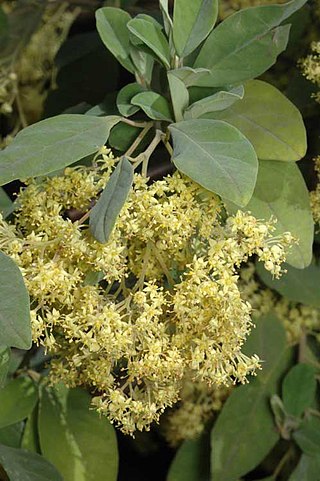
Pomaderris cinerea is a species of flowering plant in the family Rhamnaceae and is endemic to south-eastern New South Wales. It is a shrub or small tree with hairy branches, elliptic to egg-shaped with the narrower end towards the base, and panicles of pale yellow flowers.

Grevillea muelleri is a species of flowering plant in the family Proteaceae and is endemic to the a relatively small area of south-western Western Australia. It is a shrub with linear to narrowly oblong, or divided leaves with linear or narrowly egg-shaped lobes, more or less spherical clusters of white to cream-coloured flowers.

Marianthus tenuis is a species of flowering plant in the family Pittosporaceae and is endemic to the southwest of Western Australia. It is a slender, twining shrub with clustered, narrowly elliptic leaves and white flowers tinged with mauve and with darker spots on three of the five petals.
Olearia adenolasia, commonly known as woolly-glandular daisy-bush, is a species of flowering plant in the family Asteraceae. It is a small upright shrub with sticky leaves and blue-purple or white daisy flowers.

Asterolasia correifolia is a species of erect shrub that is endemic to eastern Australia. It has white to brown star-shaped hairs on its stems, lance-shaped to elliptical leaves densely covered with white star-shaped hairs on the lower surface, and white to cream-coloured or yellow flowers arranged in umbels of four to ten or more in leaf axils, the back of the petals densely covered with white hairs.
Diplolaena drummondii is an endemic Australian flowering plant in the family Rutaceae. It is only found in Western Australia. It is a small, spreading shrub with oblong to elliptic papery, thin leaves, and yellow, orange or reddish flowers which bloom between July and November.
Pomaderris clivicola is a species of flowering plant in the family Rhamnaceae and is endemic to a restricted area of Queensland. It is a multi-stemmed shrub with softly-hairy twigs, egg-shaped leaves, and small panicles of yellow to cream-coloured flowers.

Lasiopetalum drummondii is a species of flowering plant in the family Malvaceae and is endemic to the south-west of Western Australia. It is an erect, slender shrub with many densely hairy stems, egg-shaped or oblong leaves and white, pink and red flowers.
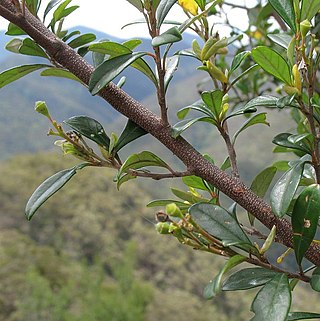
Pomaderris gilmourii is a species of flowering plant in the family Rhamnaceae and is endemic to Deua National Park in New South Wales. It is a shrub with hairy young stems, egg-shaped to elliptic leaves, and clusters of silvery buds and creamy-yellow flowers.

Pomaderris ligustrina, commonly known as privet pomaderris, is a species of flowering plant in the family Rhamnaceae and is endemic to south-eastern continental Australia. It is a shrub with hairy stems, lance-shaped to narrowly elliptic leaves, and loose clusters of cream-coloured or yellow flowers.
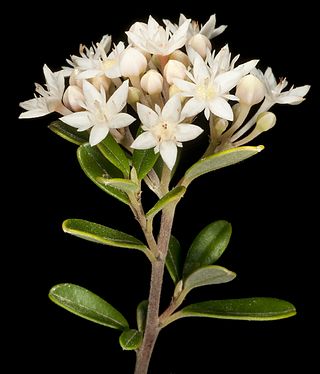
Pomaderris myrtilloides is a species of flowering plant in the family Rhamnaceae and is endemic to near-coastal areas of southern Western Australia. It is an erect shrub with many branches, narrowly egg-shaped elliptic or wedge-shaped leaves with the narrower end towards the base, and cream-coloured to pale pink flowers.
Pomaderris notata, commonly known as McPherson Range pomaderris, is a species of flowering plant in the family Rhamnaceae and is endemic to eastern Australia. It is a shrub with woolly-hairy stems, elliptic leaves, and cream-coloured flowers.

Pomaderris pallida, commonly known as pale pomaderris, is a species of flowering plant in the family Rhamnaceae and is endemic to the south-east of continental Australia. It is a compact, rounded shrub with hairy stems, narrowly elliptic to narrowly oblong leaves and panicles of cream-coloured flowers.
Pomaderris viridis is a species of flowering plant in the family Rhamnaceae and is endemic to south-eastern continental Australia. It is a shrub or small tree with hairy young stems, egg-shaped to elliptic leaves, and panicles of cream-coloured to pale yellowish-green flowers.
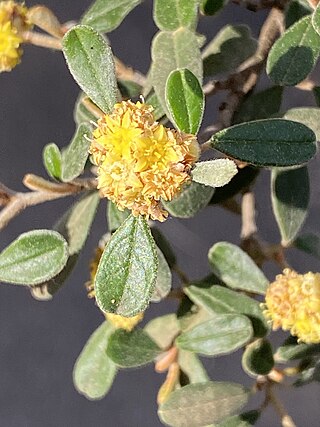
Spyridium obovatum is a species of flowering plant in the family Rhamnaceae and is endemic to Tasmania. It is an upright shrub that typically grows to a height of 0.9–2.5 m and has egg-shaped leaves, the narrower end towards the base, and about 13 mm (0.51 in) long. Small, compact heads of flowers are arranged on the ends of branchlets, the sepals either cream-coloured or yellow, depending on the variety.

Spyridium spadiceum is a species of flowering plant in the family Rhamnaceae and is endemic to the south of Western Australia. It is an erect or semi-prostrate shrub with narrowly oblong to oval leaves and heads of hairy flowers with brown bracts at the base.
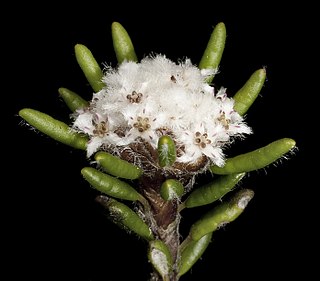
Stenanthemum humile is a species of flowering plant in the family Rhamnaceae and is endemic to the southwest of Western Australia. It is a low, erect perennial herb or shrub with white, woolly-hairy young stems, linear to narrowly elliptic leaves and densely, woolly-hairy heads of tube-shaped flowers.















